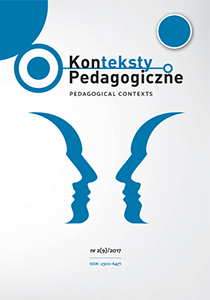Abstract
In the proper process of child development, shaping individual traits of his or her personality and developing social competence, an important role is played by the child’s family as well as by the school environment, which determines its development through educational and pedagogical activities. Children rejected and isolated do not take an active part in the class life. That is the reason why they do not have a chance to meet security and acceptance needs, which are essential for proper social and emotional development. The purpose of this article is to show the importance of proper relationship at the teacherstudent level that enhances the development of social competences of children isolated from their peers.
References
Bee, H. (2008). Psychologia rozwoju człowieka. Poznań: Wydawnictwo Zysk i Ska.
Boivin, M. (2005). Origines des difficultés dans les relations entre pairs pendant la petite enfance et impact sur l’adaptation psychosociale et le développement des jeunes enfants. In : R.E Tremblay, R.G. Barr & R.D.V. Peters (eds.), Encyclopédie sur le développement des jeunes enfants, www.enfant-encyclopedie.com/ [accessed: 22.06.2017].
Birch, S.H. & Ladd, G.W. (1996). Interpersonal relationships in the school environment and children’s early school adjustment: the role of teachers and peers. In: J. Junoven & K. Wentzel (eds.), Social motivation: understanding children’s school adjustment (p. 199–225). Cambridge: Cambridge University Press.
Baumrind, D. (1973). The development of instrumental competence through socialization. In: A.D. Pick (ed.), Minnesota Symposia on Child Psychology (p. 3–46). Vol. VII. Minneapolis: University of Minnesota Press.
Czerepaniak-Walczak, M. (1995). Między dostosowaniem a zmianą. Elementy emancypa-cyjnej teorii edukacji. Szczecin: Wydawnictwo Uniwersytetu Szczecińskiego.Deptuła, M. (2013). Odrzucenie rówieśnicze profilaktyka i terapia. Warszawa: Wydawnictwo Naukowe PWN.
Gaś, Z.B. (2006). Wybrane zagadnienia z problematyki wykluczenia społecznego. Lublin: Stowarzyszenie „Nadzieja”.
Green, V.A., Cillessen, A.H.N., Rechis, R., Patterson, M. & Milligan, J. (2008). Social problem solving and strategy use in young children. Journal of Genetic Psychology, 169, 92–112.
Gresham, F.M. & Elliott, S.N. (1987). The relationship between adaptive behaviour and social skills: Issues in definition and assessment. Journal of Special Education, 21(1), 167–181.
Jaskulska, S. & Poleszak W. (2015). Wykluczenie rówieśnicze. Poznań: Repozytorium UAM.
Klem, A.M. & Connel, J.P. (2004). Linking Teacher Support to Student Engagement and Achievement. Journal of School Health, 74(7), 262–273.
Konopczyński, T. (2006). Teoretyczne podstawy metodyki kulturotechnicznych oddziały-wań resocjalizacyjnych wobec nieletnich. Warszawa: Wydawnictwo Naukowe PWN.McFall, R.M. (1982). A review and reformulation of the concept of social skills. Beha-vioral Assessment,4, 1–33.
Noam, G.G. & Fiore, N. (2004). Relationships across Multiple Setting. An Overview. New Direction for Youth Development, 103, 9–16.
Obuchowski, K. (1983). Psychologia dążeń ludzkich. Warszawa: Wydawnictwo Naukowe PWN.
Okoń, W. (1996). Nowy słownik pedagogiczny. Warszawa: Wydawnictwo Akademickie „Żak”.
Polak, K.(2010). Uczeń w sytuacji konfliktów szkolnych. In: D. BoreckaBiernat (ed.), Sytuacje konfliktu w środowisku rodzinnym, szkolnym i rówieśniczym. Jak sobie radzą z nimi dzieci i młodzież? (p. 21–24). Warsaw: Wydawnictwo Difin.
Schaffer, H.R. (2006). Rozwój społeczny. Dzieciństwo i młodość. Kraków: Wydawnictwo UJ.
Sowińska, H. (2011). Rozwój kompetencji społecznych dziecka na etapie edukacji wczesnoszkolnej. In: H. Sowińska (ed.), Dziecko w szkolnej rzeczywistości. Złożony a rzeczywisty obraz edukacji elementarnej (s. 271–300). Poznań: Wydawnictwo Naukowe UAM.
StefańskaKlar, R. (2004). Późne dzieciństwo. Młodszy wiek szkolny. In: B. Harwas Napierała & J. Trempała (eds.), Psychologia rozwoju człowieka. Charakterystyka okresów życia człowieka (p. 85–90). Vol. II. Warszawa: Wydawnictwo Naukowe PWN.
Tremblay, R.E., Vitaro, F., Gagnon, C., Piche, C. & Rayer, N. (1992). A Prosocial Scale for the Preschool Behaviour Questionnaire: Concurrent and Predictive Correlates. International Journal of Behavioral Development, 15,222–245.
Werner, E. & Smith, R. (1989). Vulnerable but Invincible: A Longitudinal Study of Resilient Children and Youth. New York: Adams, Bannister and Cox.
Wiliński, P. (2005). Wiek szkolny. Jak rozpoznać ryzyko i jak pomagać. In: A.I. Brzezińska (ed.), Psychologiczne portrety człowieka (p. 185–187). Gdańsk: Gdańskie Wydawnictwo Psychologiczne.
In accordance with the recommendation of the Ministry of Science and Higher Education, which aims to counteract the practice of “ghostwriting” and “guest authorship,” all authors submitting their text for publication should attach an author’s statement which declares the contribution of each of the authors to the article. The printed and signed statement should be delivered by mail or other means to editor-in-chief Joanna Skibska or sent in the form of a scan to the following e-mail address: redakcja@kontekstypedagogczne.pl. The authors will not receive remuneration for publishing their papers. The editors reserve the right to make minor editorial changes to the articles which will not affect the substance of the article. We encourage all authors to prepare their articles in accordance with the guidelines for manuscript preparation. Download pdf file.
Authors transfer all copyrights and grant the journal the right of first publication with the work simultaneously licensed under a Creative Commons Attribution License that allows others to share the work with acknowledgement of the work's authorship and initial publication in this journal. All authors agree to the publishing of their email addresses, affiliations and short bio statements with their articles during the submission process.

